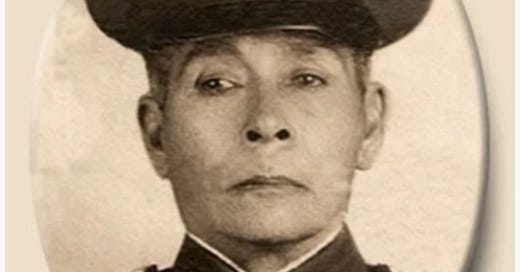June is #PrideMonth. All month long we're celebrating Pride with our friends. This page is not just an ally, we are an accomplice. For Pride Month this year we're focusing less on "love who you want" and more on "queer and trans people are in danger." In the spirit of that vibe, we're choosing to highlight activists and events where the struggle for basic human and civil rights wasn't all rainbows (see what we did there) and sunshine.
Malaquías Amelia de Jesús Robles Ávila (1889-1984) was born in Xochipala, Guererro, Mexico and was raised learning how to sew, cook and iron, but he preferred riding horses, lassoing cattle, and practicing marksmanship. He began to use the name Amelio, which everyone close to him used until he died. He joined Emiliano Zapata’s army in its quest to overthrow Porfirio Diaz in 1912, because it offered freedom from conservative rural society, not that its aims aligned with his beliefs. Robles rose to the level of colonel.
In the 1920s, Robles fought to end the government of Venustiano Carranza supported General Alvaro Obregon's presidency. After being injured, he then settled in Iguala, where he was attacked by a group of men attempting to “prove” him to be a woman. Robles killed two men in self-defense and was confined to the women’s area of the jail.
Robles met Ángela Torres and married, settling into civilian life in the 1930s and later adopting a daughter, Regula Robles Torres. He remained politically active, joining the Socialist Party of Guerrero and the League of Agrarian Communities. In 1948, he finally received the medical certificate required to officially enter the Confederation of Veterans of the Revolution, confirming that he had taken six bullet wounds in battle.
In 1955, he also began the process of changing his service files to identify him as Amelio Robles rather than his prior name; he even had a false birth certificate inserted into his personal files at Mexico’s military archives.
The secretary of national defense officially recognized and listed Robles specifically as a veterano (male veteran) of the Mexican Revolution in 1970 and included him in the Legionario Honorario del Ejército Mexicano, which made him the first trans soldier in Mexican military history. Before his death on 9 Dec 1984, Robles was also decorated with el Mérito Revolucionario.
In death, Amelio Robles Ávila has not always received acceptance as a male, however. His headstone reads "Coronela Amelia Robles" and a museum named for him uses the feminine version of his name. An elementary school in his hometown uses the correct version of his name, Escuela Primaria Urbana Federal Coronel Robles.
https://legacyprojectchicago.org/person/amelio-robles-avila
https://mexiconewsdaily.com/culture/long-after-revolutions-end-trans-soldier-foght-for-recognition/
https://blurredbylines.com/articles/amelio-robles-avila-transgender-mexican-revolution/



